‘His gift is holy persistence’
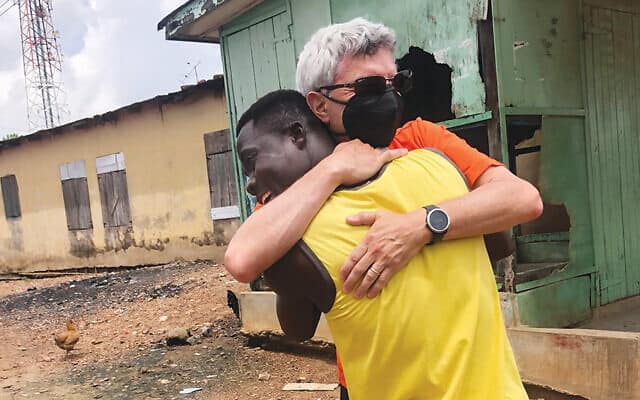
February 2, 2022 – Joanne Palmer, Jewish Standard
Evan Robbins talks about Breaking the Chain Through Education; admirers talk about Evan Robbins
On October 29, 2006, the New York Times published a heartbreaking story about enslaved children in in Africa.
It focused on Mark Kwadwo, an indentured 6-year-old — yes, you read that right — whose life on a fishing boat on Lake Volta in Ghana included work, beatings, the ever-present possibility of a deforming accident or even death, and absolutely nothing that had anything to do with childhood, except the benefits of having such a small, uncherished body to shove into small spaces.
Mark was one of many such children, sold into indenture or outright slavery by their parents, who could afford nothing else, or otherwise forced into labor.
Most people who read that story felt terrible. They — we — counted our blessings, felt pity, sympathized deeply, raged at injustice — and then we went on with our lives. There didn’t seem to be much else to do, anyway. Don’t we read stories of inhumanity all the time? Doesn’t madness lie in futile efforts to make a difference?
That’s not how Evan Robbins of Verona reacted. He helped free enslaved children, educate them, give them structure and love — and he also helped his students, back home in New Jersey, grow not only as students — that, after all, is a basic part of his job — but also as leaders and as people.
He’s straightforward, even matter-of-fact, when he tells his story.
“My younger child, Maya, was the same age as the boy in the story — she’s a senior in college now — and the differences between their lives just bothered me,” he said.
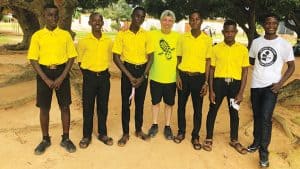
Mr. Robbins teaches AP government and U.S. history at Metuchen High school. “I brought the story to my students,” he said. He brought a speaker, Simon Deng, a human-rights advocate who had been enslaved as a child in Sudan, to his senior history class. “My students were moved,” he said. “We decided to do a walk in Metuchen to raise money. And that was the start of it.”
That first walk brought in $6,000.
The next year, there were more fundraisers; he was able to send $20,000 to help free trafficked children.
“And then, in 2010, I went to Ghana on a rescue mission” with the International Organization for Migration, a group that works with human trafficking, refugees, and internally displaced people, he said. He’d traveled widely before he met his wife, Lisa, and the two of them continued to explore the world together until his older daughter, Arianna, was born; “I’d been to Egypt, but this was my first time in sub-Saharan Africa.
“It was eye-opening.”
He landed in Accra, Ghana’s capital, and after a 13-hour drive the group — five people — arrived in Kete Krachi. They spent time on Lake Volta, talking to people they met, and then they went to a durbar — a traditional meeting. It’s a formal gathering, with rules. “You go around the circle the right way — I think it’s clockwise — and you shake everybody’s hand, and then you sit down, and then people make speeches, and then there is dancing, then a break, and then the meeting continues.” He wasn’t able to follow the discussion; it was in Ewe, the local language.
Children were being trafficked in this region, as they are in so many others around the world. The visitors wanted to talk about how it’s wrong, but that’s hard. “The roots of trafficking are poverty,” Mr. Robbins said. “People have too many children, and they have no money. There’s a history in Africa of sending a child you can’t take care of to a relative. This is a perversion of that.” Now, often, children are sold outright.
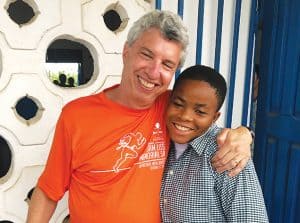
The group he was with in 2010 freed five children, four boys and one girl. They all were working on fishing boats. “The fishermen agreed to release them to us,” Mr. Robbins said. “We didn’t ever have an exchange of money. It was more persuasion.” What kind of arguments did the outsiders marshal? “I was an observer, but they would talk about how it is wrong, how you shouldn’t have children as slaves, how it is against the law.” Somehow, it worked.
“Once the children were released, we brought them to the hotel. The children went from having no expression, showing no emotion, to smiling and laughing.
“Children can be trafficked when they are as young as 4, 5, 6,” he continued. “There was a 6-year-old who had been there for years.”
The Ewe name their children after desirable attributes, and often those names are in English, Mr. Robbins said. He’s still in touch with two of those children, all these years later. Their names are Bright and Wisdom.
“Bright’s parents were separated; his father came back, said he wanted to take him for the summer, and sold him. His mom didn’t know where he was for five years. Wisdom was living with an elderly grandmother who couldn’t care for him, so she trafficked him.”
“They went to a rehab center after they were freed,” Mr. Robbins said, but after that there wasn’t much follow-up. Most of the nonprofit groups that freed enslaved children focused on that vitally important part of their mission. After two years at most, the liberated children were on their own. “Some are struggling, some are re-trafficked, some go back to their parents.” But if their parents had sold them in the first place, that reunion couldn’t be easy, and its outcome couldn’t be assured.
That first trip — he’s been back often, usually about once a year — convinced Mr. Robbins that he should start his own 501c3 organization. “I didn’t want to work through someone else,” he said. “I wanted to be able to raise more money, and to have more control over how it gets spent.” And he wanted to focus on long-term care.
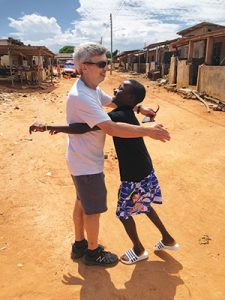
To get there, he had to make a difficult choice, he said. He could focus either on numbers, helping to rescue many trafficked children, or he could use those same resources more intensely on fewer children.
The organization he created is called Breaking the Chain Through Education.
“So we hired a social worker, and then we decided to build a school. I read the book ‘Three Cups of Tea’” — a memoir about an American man who built schools for impoverished, education-deprived and -thirsty girls in Afghanistan and Pakistan — “and I decided that I would build a school in return for the release of 20 kids who had been trafficked.” The villagers had to commit to releasing children they had enslaved in order for the school to be built.
“And we built that school! I raised about $60,000 for a six-room school in 2012.”
About three years ago, Mr. Robbins opened an office in Ghana; it’s run by a staff he hired. “I fell in love with the children we care for, and I want to help them be better,” he said. “I always ask myself, ‘How can we do it better? How can we take it to the next level?’
“So now I have a staff of four people, and we agreed to take on 30 more kids, but not to do any more rescues or rehabs. I was just paying other people to do it, and I had no expertise in that. But I was able to help kids achieve long-term success through education and a trade. I know how to do that.
“When I was doing a rescue, I was just giving somebody money. I don’t have any expertise in that.”
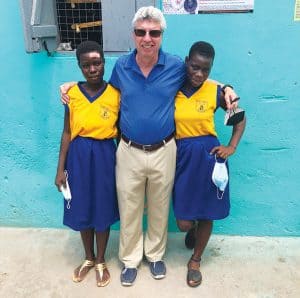
So now he fundraises — last year, he raised about $280,000, he said — and uses the money for this long-term support.
“The rules are that we support them as long as they are moving toward independence,” Mr. Robbins said. “They have to be learning a trade, getting an education. Some of them now are almost 30. They lost so many years of their lives. We are trying to get them to be able to support themselves, to get out of poverty and be somewhere in the middle class.”
All of this comes from his Jewish values, Mr. Robbins said.
He and his family belong to Congregation Agudath Israel in Caldwell, and his daughters went to school at the Golda Och Academy in West Orange. “It’s hard to say which part of what I do comes from my Jewish values,” he said. “I can’t separate it out.” It’s entirely who he is.
“We are told that saving one life is like saving the world, but what does it mean to save a life?” he asked rhetorically. “Just getting them out of slavery, setting them free, wasn’t enough for me. You have to see them through.
“It’s a kind of universal value of love and care. The kids call me all the time. They call me Daddy. That’s a Ghanaian custom. It’s a sign of respect.
“When I see them after not seeing them for a year, they break into tears of joy. They have never had anyone care for them, or even be concerned about them.”
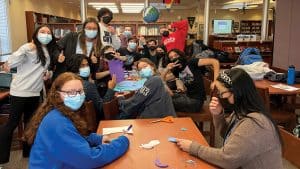
He recalled being in Ghana this summer. “We got together with the kids; we all had dinner in the office,” he said. “They all got up and talked. I said that I wanted them to be like a family to each other, to be there for each other. Their families had let them down, but they were there for each other.”
He told some success stories. “We set Bernice’s mother up in business, but it went under,” Mr. Robbins said. “And she made horrible decisions for her daughter. When Bernice was 16, her mother decided that she should live with a 34-year-old man, who impregnated her. Once we got her out of there, we put her up in her own house, and took care of her and her son.
“Now she’s about to start an apprenticeship as a beautician, and her son is 5, and in school; he’s the cutest kid you’ve ever seen. She made a speech about how appreciative she is.
“I’ve known her for 10 years. I saw her go through ups and downs, and now I’ve seen her coming into her own. It is so special.
“There’s Joshua, who kept getting kicked out of school, and now he’s going to be an electrician. So many of them have so much to overcome, and we let them figure it out. We stayed with them. Samson too will be an electrician; in May, they’ll both get their commercial licenses. To see them struggle, to be kids, and then to grow up and become mature people, who you’d be proud to call your son — that’s wonderful to see.
“We’ve stayed with them. It’s not always easy. But we tell the kids that if they’re not even trying to move forward, that we can’t take care of them anymore. But if they fix their act, they can come back.
“You have a part to play in it, too, we tell them. You have to work hard.”
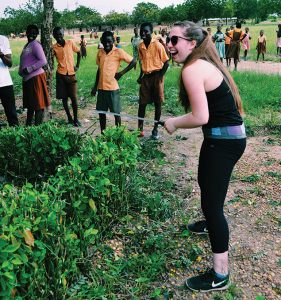
So when he listens to them talk about their progress, he’s thrilled. “It validates your work,” he said.
Meanwhile, back in New Jersey, Mr. Robbins moved his nonprofit work from a class to a club. “I wanted the kids to be able to be involved in it for four years, not just for a semester or a year,” he said. “It’s by far the biggest club in the school; about 10 percent of the school comes to our weekly meetings.”
Students are involved with fundraising — there’s a big annual dinner, and a walk — and they also run the activities. “I guide them,” Mr. Robbins said. “We are doing a movie night for the elementary school; there’s a dance performance. The students designed a sweatshirt to sell as a fundraiser. One of the kids drew it. It’s a bulldog breaking chains.” Metuchen High School’s mascot is a bulldog. “And there’s a baking class, where they bake cookies; we charge parents to watch it.”
Students develop long-term relationships with the work they do with Breaking the Chain. “One of my former students now works at the State Department, and focuses on trafficking in Africa,” Mr. Robbins said. “She has made it her life’s work. I have a group of alumni students who now are young professionals in New Jersey and New York who work with me, who now come to the dinners as adults,” he added.
Breaking the Chain has started a sponsorship program; in return for sending money that supports a particular child, the sponsor can develop a relationship. “It’s a great bar or bat mitzvah project,” Mr. Robbins said. “The three co-presidents of the club now each support a kid. They send money they earn at after-school jobs.”
Rabbi Debra Orenstein leads Congregation B’nai Israel in Emerson; the focus of her social-justice work is freeing enslaved and trafficked people. She admires Mr. Robbins, with whom she has worked, immensely.
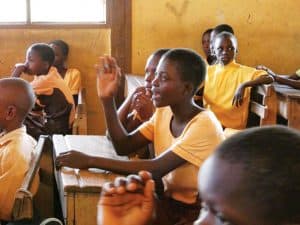
“What’s most remarkable to me about him is his perseverance and persistence,” she said. It’s not unusual to have been moved by the story in the Times that started his work. “People get these calls, this sense that there is an issue that is speaking to them. They might say, ‘Hey, somebody should do something about this.’ They might do something about it for a while. But it is very rare to have one of those moments, and then never to let go of it.
“It’s multigenerational at this point. There are adults out in the world now for whom this remains an important issue because they learned about it from Evan.
“And another part of his staying power is that he has maintained the school club. So much of what happens in schools goes in and out of fashion, in terms of what’s the popular club, or the cause that everyone has to support. But he’s kept on going, and that’s really rare.
“I think that his gift is holy persistence.
“His gift, the seventh of sephirot, is netzach.” Endurance. “It is a divine endurance.”
She first heard about Mr. Robbins when she read a story in the Jewish Standard in 2013 about a 13-year-old girl in Fair Lawn. That girl, Jessica Baer, had heard about Breaking the Chain when Mr. Robbins came to speak at her summer camp, Nah-Jee-Wah, in Milford, Pennsylvania, when she was 12. “For her bat mitzvah project, Jessica raised money for Evan’s organization. I wrote in Sharpie at the top of the story that ‘If a 12-year-old can do it, you can too.’” Rabbi Orenstein got in touch with Jessica’s father, Michael Baer, who also became deeply involved in Breaking the Chain, “and that led to more and more mitzvot,” she said.
Christina Le, who graduated from Metuchen in 2008, first knew Mr. Robbins as a teacher, before he started to work with trafficked children. When she was a senior, she was in the first class he taught after he’d gotten involved with Ghana. “Mr. Robbins is one of the most incredible human beings you could ever come across,” she said. “The funny thing is that I still call him Mr. Robbins, out of respect. The level of inspiration and caring that he brings to others — even in high school, he was able to get us to the point of really caring, to actually working on this project.
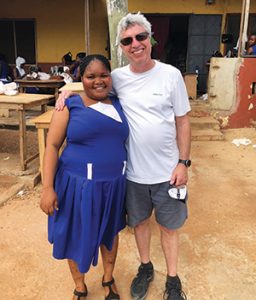
“He inspired us on history alone, and that is a rare thing,” she said. She took U.S. history with him, and then she and her cousin both “took a model Congress class with him. We cared nothing about the law, but we took it because he was teaching it.”
That was the first year that Mr. Robbins brought his social justice work in Ghana to school, and Ms. Le and her friends joined it enthusiastically. “That first year, raising money, doing walks, we were able to save 10 kids,” she said. She’s stayed in touch with Mr. Robbins and with Breaking the Chain. “He has done an incredible job,” she said.
Ms. Le now works in wholesale fashion; one of the lessons Mr. Robbins taught was that help and support can come from anywhere. You just have to be creative. “I can get a ton of samples, and we can sell them, get some money, and send the money over to Ghana — it’s cheaper to buy clothing there than it is to ship it from here,” she said.
She has a network of friends who all fundraise for Breaking the Chain and spread the word about its work.
“To see acts of kindness at the level that Mr. Robbins does them is so rare,” she said.
One of his gifts as a teacher is his charisma, she added. “He is so funny, and he’d always bring great stories.” The traveling that he’s done, and the experiences he’s had, allow him to bring a wider perspective to his students. “He understood that putting us in another person’s shoes made it easier to understand that other person.
“And he is so full of energy. Even when a kid did something wrong, he always was there. He was emotionally supportive. He was our high-school dad, and we loved him so much.
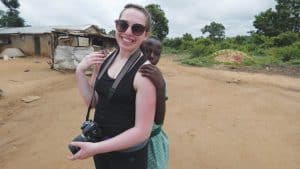
“After we graduated, he was always the person we went back to high school to visit. We’d see other people too, but he was the one we went to see.”
Brooke Margolin was a president of the Breaking the Chains club when she was at Metuchen High School; now she’s a senior at Rutgers.
She met Mr. Robbins when she was in middle school, she said; she was a dancer, and performed at a Breaking the Chains benefit with her studio, the Metuchen Dance Center.
When she was in 10th grade, she joined the club. “I’d thought about doing it before, but I finally went then,” she said. As he always did, Mr. Robbins started talking about his work in Ghana, and she was hooked.
She became active in the club; by her junior year, she was a vice president. She continued to dance at the benefit, and she started some other fundraising activities, including a tricky tray auction. She had twin sisters, Julianna and Rebecca, who were a few years below her in school; they too joined the club. “And then we had the great opportunity to go to Ghana with Mr. Robbins,” she said.
It was 2017, the summer before her senior year, and she was set to become president. She, her sisters, and her father, Josh, and Jessica Baer and her father, Michael, who’d become a member of the board of Breaking the Chain, went to Ghana together.
They spent about a week there. “We met a significant number of children, and it was a fascinating experience,” Ms. Margolin said. “He went in depth with every child. It was the same protocol for every child; we’d meet with the principal and the teacher, we’d drive to the school, go into their classroom, meet the child and play with them, and then go back to the home and meet the parent or caretaker. We took notes; we discussed the child’s performance in their school, and their mental, social, physical, and emotional well-being.”
Those Ghanaian children ranged in age, but “every one of them had been rescued, and every one of them had a different story,” Ms. Margolin said. “Some lived with their parents. One of them who we met, who Evan considers to be a poster child for the organization, lived with her teacher, and applied for university. It was eye-opening.
“We got to really cut through some of the trauma they had faced, and we had the great fortune to get to know them as people. Take away that they were formerly trafficked children — we had to forge relationships.”
Language could be a barrier, but they overcame it, she said. “Lizzie, who was the one who had lived with her schoolteacher, she always loved dancing. We had a show, and my sisters and I performed an American tap routine, and Lizzie had some members of her community do a dance for us.
“We were able to communicate beyond the language barrier. We found other ways to get to know each other.”
Mr. Robbins’ work has had a lasting effect on Ms. Margolin. “I am majoring in public health, with certificates in global health and health policy and health disparities, and I’m also getting an MPH in epidemiology. One hundred percent I wouldn’t have done that without that trip.
“When we were in Ghana, many of the people we were with, including my sisters and my dad, all focused on the child well-being and education aspect, but my focus was drawn a little more toward innovative solutions to increasing sanitization, to focusing on getting clean water, and on food safety and disease control.
“I remember seeing students at their school turning over a gallon milk bottle with a pulley system, where they’d step on a piece of wood and that would tip the bottle and water would pour out. That’s how they washed their hands.”
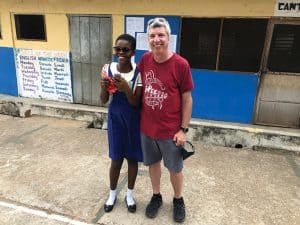
Ms. Margolin also knows that she learned some pragmatic, transferable skills from Mr. Robbins. “Planning, organizing campaigns, drafting grant proposals, all these advanced skills that you tend to learn when you are getting an advanced degree — I had the opportunity to learn it in high school.
“To this day, Evan and I joke about how we are opposites. He is very laissez faire. He has a big picture that he wants you to achieve. And I am the opposite. I have a tendency to micromanage. I really like every detail to be perfect.
“That created an interesting dynamic. He was the club advisor, with all this information, and the relationships that he had built, and he was able to say, ‘This is what I want to do.’ And I was able to raise x amount of dollars, and say, ‘This is where it will go. This is how we will allocate it.’ So we had the before — this is what I want — and the after — this is what we did.”
Ms. Margolin is Jewish — she and her family belong to Congregation Neve Shalom in Metuchen — and “I definitely see a connection between Jewish values, particularly of tzedakah, and our work in the club,” she said. “I went to preschool at Neve Shalom, and for Hebrew school, and I remember that before every class in Hebrew school, we would start with the tzedakah jar in the front of the class. Every student had their bag of change, and we’d put it in, and we’d always talk about where the money was going, and about the importance of giving back to your community, and helping those not in the same position as you.”
Sophie Lunt is a senior at Metuchen High School, and she’s one of the three Breaking the Chain co-presidents this school year.
She joined the club “because it was the biggest club in the school, and a lot of my friends were joining it,” she said. It was a fairly cold entrée, but her relationship to it heated up quickly. “I do dance, and I just thought that it was really cool how dance was making a difference for children in Ghana.” The club continues to offer a dance performance as a fundraiser, as it has since it began. “There was nothing comparable to it anywhere else in the school.”
Ms. Lunt plans to continue to join clubs like Breaking the Chain when she’s in college, and “after college, depending on what happens, I actually will volunteer for it. I think it’s a really good way to keep in touch with everything that’s going on.”
She sponsors a child. “It’s new this year,” she said. “You can pitch in whatever amount you want monthly, and that goes to one specific child. You can email them.
“I had the privilege of speaking on the phone to my child, who I believe is 20. She has a daughter. She just passed her exams and she is going on to pick a university. We talked about how we are in the same position right now, and it is really cool, being able to be in touch with someone and see the tangible effects of your contribution.
“Breaking the Chain is just truly amazing,” Ms. Lunt concluded. “Mr. Robbins — everything he does is out of this world. It’s amazing, how much effort he puts in, and everything he does for those kids.
“I take a history class with him. He’s an engaging teacher. He doesn’t like to teach from a textbook. He’s just really amazing.”
Learn more about Breaking the Chain Through Education at www.btcte.org.





